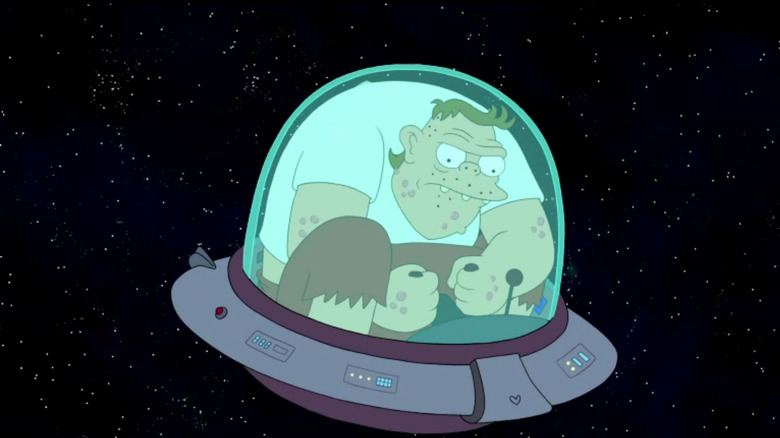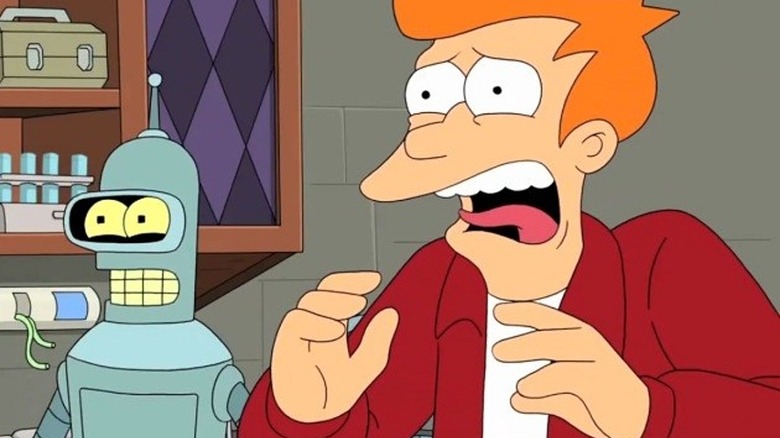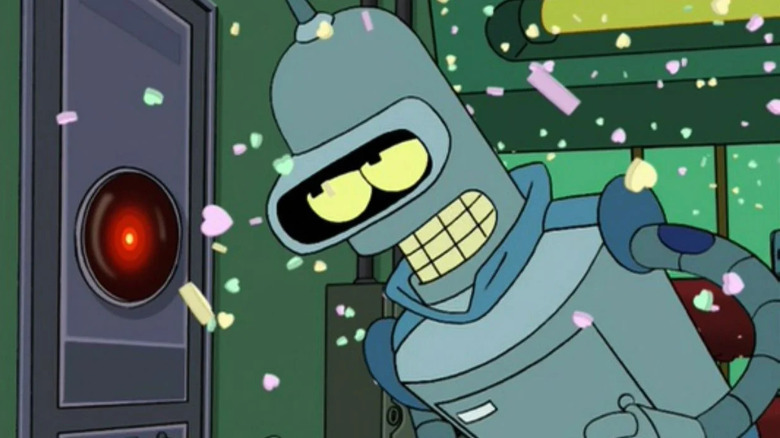Futurama Had An Unspoken Explanation For Traveling Faster Than Light
Watching "Star Wars," one gets the impression that the galaxy in which it takes place is incredibly, incredibly small. Despite there being hundreds of worlds and hundreds of alien species, each planet can be accessed poking around at mere light speed. In our own galaxy, the next star over from Earth — Proxima Centauri — is 4.24 lightyears away. No one in "Star Wars" makes four-year trips. Indeed, in Irvin Kerschner's "The Empire Strikes Back," Luke Skywalker (Mark Hamill) takes off in a light attack craft to visit Yoda on a distant swamp planet. His trip doesn't seem to have taken more than a day. Can a light attack craft travel many times the speed of light? That kind of travel tech is never addressed in the "Star Wars" movies (although there are likely expanded universe explanations for how characters can get across a galaxy so fast).
On "Star Trek," the writers had to invent a fictional propulsion engine — a warp drive — that would allow spacecraft to travel many times the speed of light in order to traverse the galaxy. Warp 1 is the speed of light (about 670 million mph), but each warp factor expands on that exponentially, making Warp 9 somewhere in the school of 7,912 times the speed of light (this is going from a chart in an old "Star Trek" encyclopedia). Space is so G.D. vast that even "Star Trek's" fictional device had limitations.
Matt Groening's and David X. Cohen's 1999 animated series "Futurama," a show run by proud math nerds, was too scientifically meticulous to let galactic travel go unaddressed. In one of many "Futurama" interviews conducted for Appalachian State University, Cohen revealed his worries and their scientifically cavalier solution.
It's faster now
Cohen, who himself has a BA in physics from Harvard and an MS in computer science from UC Berkeley, was always very math-minded when it came to writing "Futurama." The show is rife with discreet math jokes as well as jokes about discrete math. When working on a sci-fi show, Cohen wasn't about to let problems with intergalactic travel go unaddressed. As everyone knows, one cannot travel faster than the speed of light as it would eventually require an infinite amount of energy (E = mc2, and all that). A friend of Cohen's, a man named David Schiminovich, had a clever solution. From a 2005 Appalachian interview:
"Here's one more, and credit to David Schiminovich again ... [O]ne of my favorite math and science things from 'Futurama' is the question of how they can travel around the universe even though you can't go faster than the speed of light. Before the show went on the air, I was very worried about this (unnecessarily it turns out, because nobody cares). So I talked to my physicist friend David Schiminovich, and we talked about a few possible reasons why they could go faster than the speed of light. The ultimate one we settled on, which I'm very proud of, is that they are not going faster than the speed of light, but that they have increased the speed of light in the future."
If light is now going faster than the current speed of light, then ships can now go faster than the speed of light without breaking the speed of light! Simple! the new speed of light was also never re-established, so as far as the audience knows, the new speed of light might be millions of times the old speed of light. We can enter the Speed Force whenever we like. I mean, why not?
Still sticking to the physics
Cohen, despite this handy hand-wave to actual physics, couldn't let the science go entirely, however. Okay, so the speed of light has been increased. Cohen began to wonder how that might have happened. If humanity could invent a technology that could essentially re-write the laws of physics (recall: Cohen has a BA in physics) then when and how was that achieved? Cohen pondered out loud about areas of space where physics work differently than in our own area:
"We never got around to showing the back story of how that happened exactly, but in my mind, some reaction was set off on Earth or somewhere nearby, and there's an expanding bubble moving out through the universe — and within that bubble the speed of light is now faster, and outside of it, it is still what is was before. People actually study this in physics — that there may be regions of the universe where there is a boundary where the laws of physics change on one side or the other. Kind of interesting..."
With "Futurama" set to return — again — in the near future(ama), there is every chance that Cohen will be granted an opportunity to (over)explain the universe and how it works. The central conceit of the show is that the distant future has provided ineffable technological advances, and untold access to myriad alien worlds ... and we humans are all still kind of idiots. There's certainly a comfort in a show about idiocy that is carefully orchestrated by smart people.


